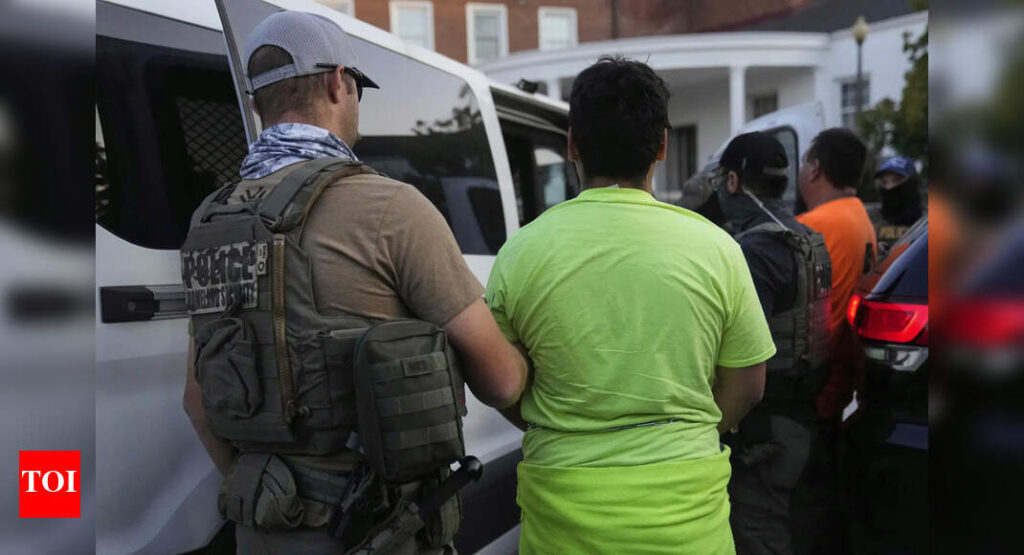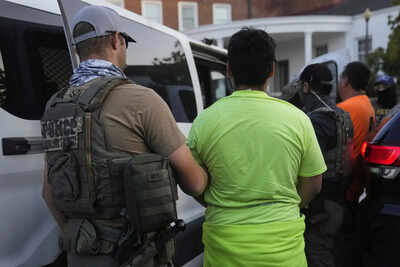As ICE arrests rise, Florida schools see measurable declines in student test performance, study finds

A new study by the National Bureau of Economic Research has found that the surge in immigration enforcement during and after the Trump administration’s tenure may be quietly reshaping classrooms — and not for the better. Researchers say that heightened arrests and fear of deportation are not only affecting immigrant families but also dragging down the academic performance of U.S. citizen students who live in Spanish-speaking households, according to a report by Chalkbeat.The findings, released as a working paper by NBER, suggest that when immigration raids and arrests rise, test scores fall. The study draws on detailed data from a large Florida school district, where students’ test scores were tracked over several years alongside immigration arrest rates, Chalkbeat reported.
Findings from a Florida school district
Researchers David Figlio and Umut Özek discovered that student performance declined after immigration enforcement intensified under the Trump administration. The drop was modest but consistent, and it affected both immigrant and U.S.-born students from Spanish-speaking families.The impact was most severe in high-poverty schools and among students who were already struggling academically. Figlio, a University of Rochester economist, said the evidence shows that simply living in a community facing increased scrutiny can affect a child’s learning, regardless of their citizenship status, as noted by Chalkbeat.
Measurable score drops linked to enforcement intensity
Because Florida students take standardized state tests three times a year, researchers could observe progress before and after enforcement actions ramped up. Each one-percentage-point increase in immigration arrests was associated with test score declines equivalent to 10 to 15 SAT points on average.This reduction represented about 10 percent of the district’s average test score gap between English- and Spanish-speaking students. High-performing Latino students largely maintained their results, but those who were already behind saw sharper declines, Chalkbeat reported.
Broader effects beyond academics
The analysis also revealed a decline in disciplinary incidents among Latino and Spanish-speaking students. Researchers were unsure whether this meant students were avoiding trouble out of fear, or if school staff were responding with greater understanding and flexibility toward students under stress. Attendance rates in the Florida district did not change significantly.However, other research paints a different picture. Stanford professor Thomas Dee found a 22 percent jump in daily absences after an immigration raid in California’s Central Valley, especially among elementary students whose parents feared being detained. Another study by Kirsten Slungaard Mumma at Columbia University’s Teachers College showed similar increases in absenteeism among English learners in Connecticut and Rhode Island, as highlighted by Chalkbeat.
Enforcement reaches homes and schools
Federal immigration activity has increasingly entered neighborhoods and community spaces once considered off-limits. In recent months, agents have raided apartment complexes, arrested parents and teens near schools, and detained a Chicago child-care worker while she was on duty.The Trump administration eliminated a long-standing policy that treated schools and day cares as “sensitive locations” where enforcement was largely restricted. Officials maintain that they are targeting violent offenders, but ProPublica has documented at least 170 instances where U.S. citizens were mistakenly detained, sometimes for days.“This is an era of immigration enforcement unlike any in recent memory,” Dee told Chalkbeat, noting that enforcement is now “everywhere and always,” rather than limited to isolated raids.
What it means for schools and educators
Figlio and Özek said their research does not prescribe specific immigration policies but highlights a clear need for stronger academic and emotional support in affected communities.“Educators are responsible for teaching all students who come to school,” Figlio said in comments to Chalkbeat. “Districts may need to put more resources into schools with higher concentrations of foreign-born and Spanish-speaking students, not just for immigrant children but for everyone in those communities.”






